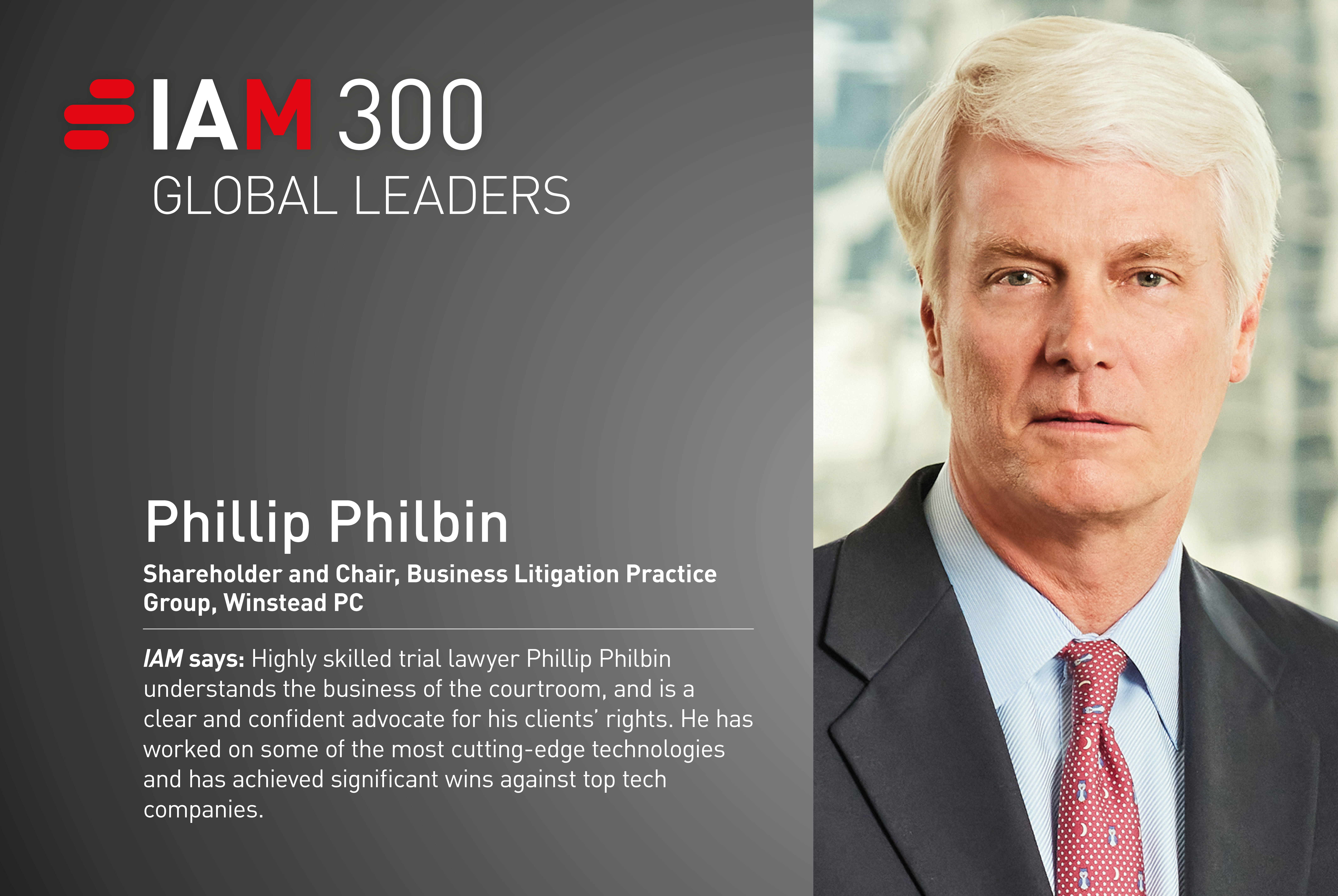Phillip Philbin
You have been at the leading edge of IP litigation for three decades now, with numerous awards and recognition to your name. What is the secret to your success?
Good old-fashioned hard work, surrounding yourself with an outstanding team and preparing for trial every day of the case are all essential and have resulted in some significant wins representing both plaintiff and defendant. As for the secret to my success – I married the right lady. Together, we have raised three outstanding sons while I have maintained a busy trial docket. I could not have done it without her. The support I have at home allows me to deliver results at the office.
What are some of the biggest challenges facing your clients right now, and how are you helping them to overcome these?
Patent litigation continues to evolve. Technology always develops faster than the law. Clients want certainty and a changing body of law rarely provides the right level of this. Helping clients navigate this uncertainty is both a challenge and an opportunity. Venue, finding or avoiding, has been evolving significantly recently. The rise of distributed computing and cloud computing will continue to challenge conventional patent laws.
Evolution in the law takes place not only in the court system but also in Congress and the patent office. From business method patents to Section 101 challenges to venue disputes, I have had the opportunity to counsel clients on a multifaceted approach to change.
As more and more industries are affected by technological convergence, what considerations should patent owners bear in mind when assessing their existing IP strategies?
The Internet and cloud computing are two examples of how technology is forcing the law to evolve on issues such as venue and divided infringement. Starting as early as claim drafting, patent owners have to analyse how and where a patent could be infringed today and anticipate how and where it could be infringed a decade or so in the future. Technological evolution and convergence also present opportunities to partner with other industries from cross licences to pooling patents.
You are known for your strategic approach to IP matters – how has this broadened your understanding of the different forms that a ‘win’ can take?
Efficient and effective legal service is what I desire to deliver. One of the first questions I ask a client is: “What is your definition of a win?” Depending on the client’s answer, I can craft a legal strategy to efficiently and effectively achieve that result. Having asked that initial question many times and receiving myriad responses, I believe now more than ever in the need for the client and its legal team to be laser-focused on the same destination from the very beginning. When in sync, everyone understands the mission and individual decisions are all driven by the ultimate goal.
As well as being a litigator, you have extensive experience in helping clients monetise their assets. How have attitudes to monetisation shifted over the course of your career?
Patents are an asset. I have been fortunate to see patents mature dramatically as an asset class throughout my career. Early on in my career, patents were lumped into an asset purchase agreement as ‘all intellectual property’ and were rarely monetised. Now, patents are financed, auctioned, leveraged, pooled, underwritten, litigation funded and a vital part of many companies’ valuations. When speaking internationally, a frequent question I am asked is why patents are valued so highly in the United States. After some reflection, I can answer confidently that the United States values innovation and invention like no other country in the world. Patent monetisation was frowned upon until Texas Instruments and IBM showed the rest of corporate America how valuable patent assets are. Those early leaders caused uneasy conversations in boardrooms around the country about why companies are not monetising their patent assets. Now the same evolution that took place in corporate America is happening in higher education – we have some early monetisation leaders that are causing the same types of conversations at university board meetings. It is fascinating to be a part of both evolutions.
Phillip Philbin
Shareholder and Chair, Business Litigation Practice Group
[email protected]
Phillip Philbin is an experienced first-chair trial lawyer. For more than 30 years, he has made creativity, precision, intensity and attention to detail the hallmarks of his practice. Mr Philbin listens to his clients, uses his trial skills to extract the truth from witnesses and has perfected the art of persuasion to explain the technology and science behind the most complex cases he tries across the country.
